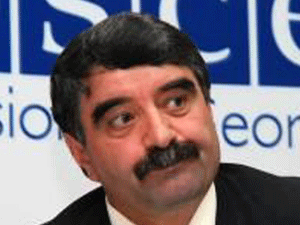Vladimer Gabaraev: “Even If We Owe Blood to Each Other, Ossetian and Georgian Peoples Should Find Common Language”
Mari Otarashvili
 Three-day visit of Human Rights Commissioner of the CoE Thomas Hammarberg in Georgia finished short time ago. However, the Commissioner left two international experts Bruise Richard Peg (from Australia) and Nikolas Sebire (from France) in Tskhinvali. They study the case of missing Ossetian people and are still in Tskhinvali.
Three-day visit of Human Rights Commissioner of the CoE Thomas Hammarberg in Georgia finished short time ago. However, the Commissioner left two international experts Bruise Richard Peg (from Australia) and Nikolas Sebire (from France) in Tskhinvali. They study the case of missing Ossetian people and are still in Tskhinvali.
The exchange of hostages between Georgian and Ossetian sides still remains serious problem between Georgian government and Ossetian secessionist officials. Georgian side still proclaims that there are no Ossetian hostages on its side; while de-facto governmental officials of South Ossetia already started to threaten Georgian side.
“Georgian side should not expect us to do good job, until Georgian officials settle the problem of assigning our citizens to us. Let the relatives of the Georgian citizens who are imprisoned in Tskhinvali prisons know it,” said separatists and added that sins of Georgian side are increasing. They mention one more example – on February 28, Thomas Hammarberg brought three citizens of Russia in Tskhinvali. They were ethnic Ossetian people and were arrested in Gori short time ago. One of them arrived in Gori from Russia to see her sick mother. There, according to the news agency “Kavkaski Uzel”, Georgian law enforcement bodies did not even let her to bury her dead mother. The names of the women are not published yet.
Representative of the de-facto government in exchange of hostages Boris Chochiev clarified to local journalists that the three captured women released on February 28 had no connection with general exchange of hostages.
“Three Ossetian women were detained in Gori who were residents and citizens of Russia. One of them arrived in Gori to see her sick mother who died on the same day. The government of Georgia did not even let her bury her mother and detained them. The women spent night in the detention setting. Later they were assigned to Russian border officers. Doing that, Georgian side pretended to demonstrate its kind will,” said Chochiev.
It is not excluded that Russian citizens visited Gori without visa and they were detained for that reason. Later, according to the law, they were deported to Russia. However, Georgian side does not make official comment on the fact and it enables the separatists to pay particular attention to it.
Chochiev said government of South Ossetia informed Thomas Hammarberg that if Georgian side wishes to deliver the three women detained in Gori, they should be assigned to the officials of Russian Federation.
Boris Chochiev: “Government of South Ossetia has nothing to do with these women. For example, if ethnic Ossetian people are detained in Istanbul who are not citizens of South Ossetia, we cannot have anything to do with them.”
Nothing has been settled in regard with the release or exchange of hostages. We told Thomas Hammarberg that Georgian side shall not expect us to do good job before officials from Georgian authority decide the issue of releasing our citizens. Let the relatives of those Georgian citizens who are in Ossetian prisons know about it too. February has already passed but we have not learned anything about our citizens. Furthermore, Georgian law enforcement officers detained one more our citizen Genadi Pliev at the beginning of this year.”
Thomas Hammarberg reported that 11 Georgian prisoners in Tskhinvali are in normal conditions. None of them is beaten and all of them are under control of doctor. Hammarberg said he could not request the de-facto government of South Ossetia to release Georgian prisoners. “At that time, the leaders of Tskhinvali authority were in Moscow and I could not meet them,” said Hammarberg.
Generally, late in 2009 and early in 2010 more people are detained and kidnapped in Georgian-Ossetian conflict zone and this fact is confirmed by both sides. Several hostages were exchanged with the support of Thomas Hammarberg.
During his final visit Hammarberg stated that there are hopeless situations in similar processes. “In similar situations we encounter complicated moments and I do not want to speak about it. Now, I cannot say anything about the issue but I hope the process will continue.”
It is interesting that there are people in the de-facto authority of South Ossetia who state that Georgian and Ossetian people can resolve the problem of hostages better than European Commissioner Thomas Hammarberg can.
Vladimer Gabarev, De-facto MP of South Ossetia: “There is no better diplomacy in the world to reconcile the two conflicting sides than public diplomacy. Both (Georgian-Ossetian) sides should reach some agreement. Neighbors shall speak with each other. Even if we owe the blood to each other, there should be somebody who will be responsible for achieving the consensus. There were no more two nations closer than Georgian and Ossetian peoples. It is very good that Hammarberg arrived to resolve our problem but neither African nor European person shall mediate between us better than our– Georgian and Ossetian people.”
Conflict expert Paata Zakareishvili confirms that the problems can be easily resolved if Georgian side will wish it. “Unfortunately, the government of Saakashvili has selected the policy to turn Georgian-Ossetian conflict into a international one. Finally, he is trapped in his crimes. For example, they were hiding 5 hostages in the basement in Gori and showed those people later… of course, the best way is to find common language for Georgian and Ossetian peoples. It is easy to do it if we there is desire and if Georgian side will start to contact Ossetian side; however, Saakashvili’s government does not want it.



